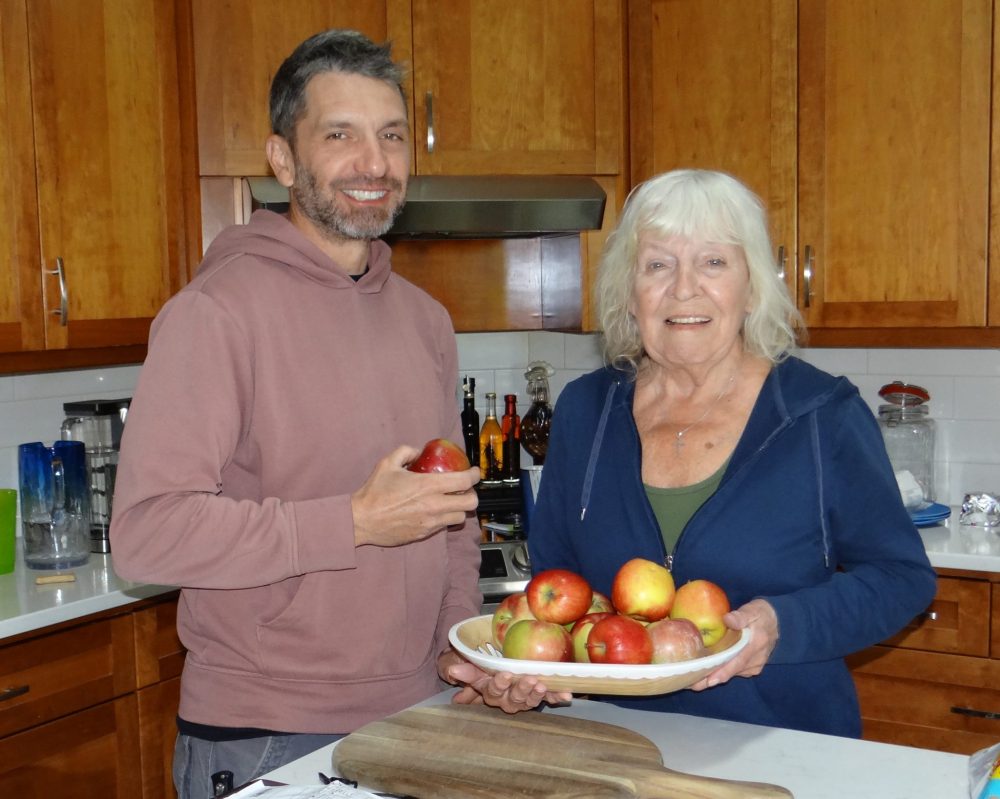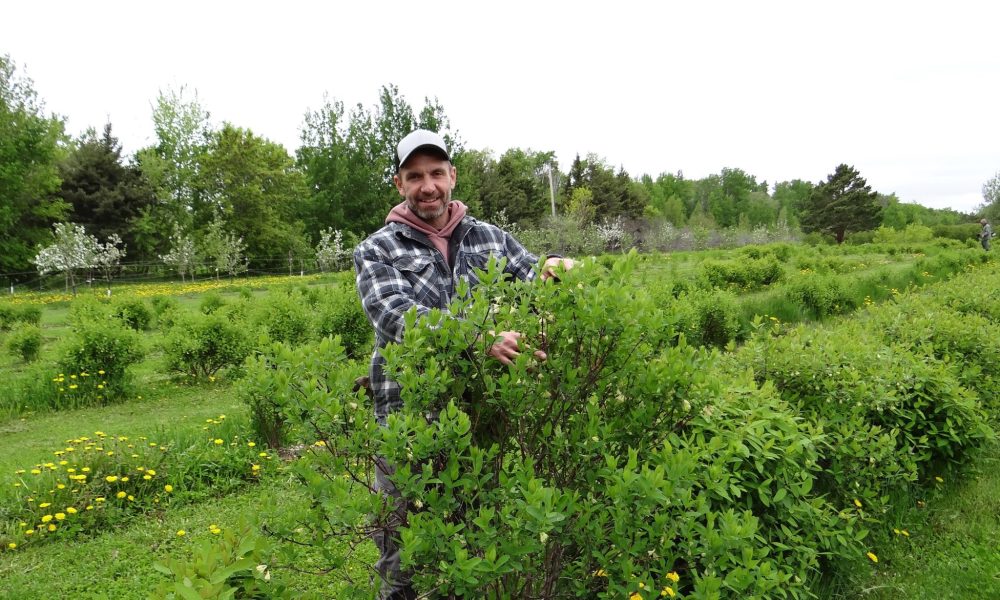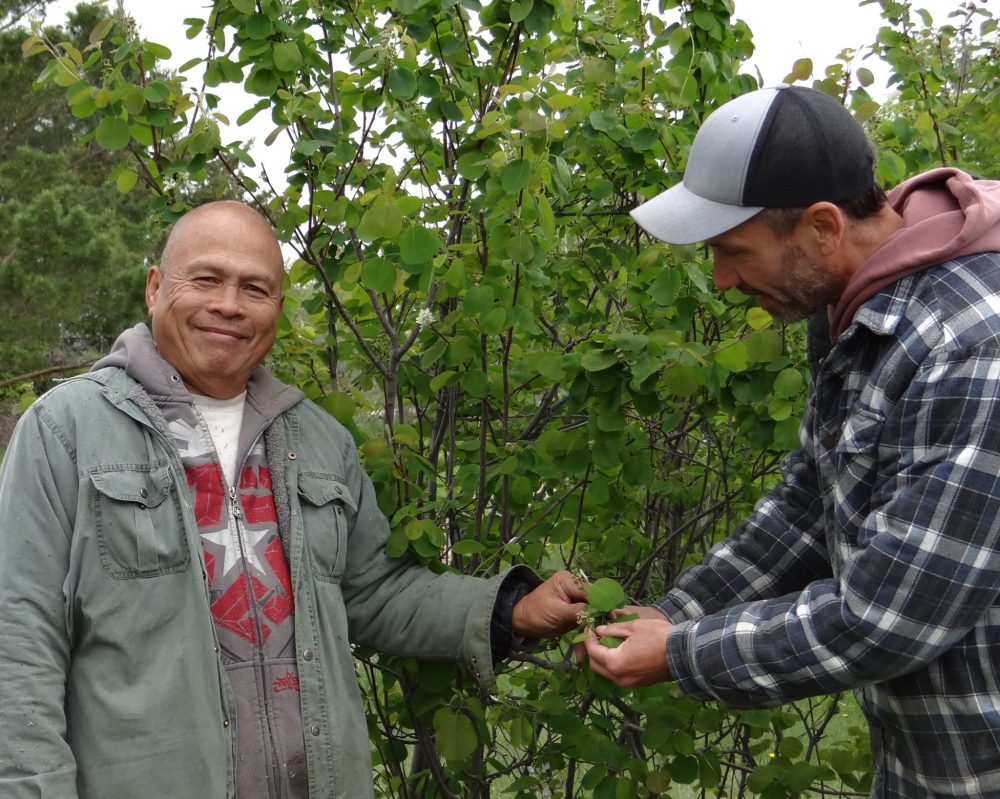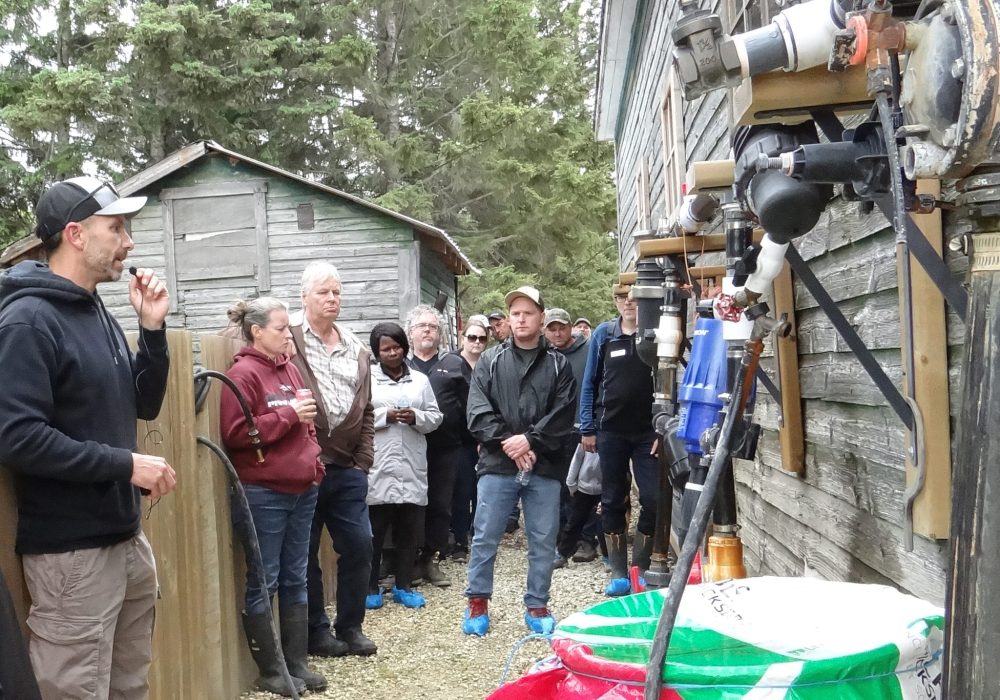Gibson Farm provides a perfect seasonal job
Advertisement
Everett Gibson lives in Winnipeg, but spends most of his summers taking care of business at Gibson Farm, three miles west of Ladywood, Manitoba.
Everett’s father Brian works in Winnipeg, and he and his wife Patrice live on Gibson Farm, three miles west of Ladywood.
It’s the best of both worlds for father and son in this joint enterprise. Brian Gibson grew up on a farm and always wanted to return to the rural life, so he went farm shopping with his son when Everett was looking for a change after a career in the military.

When the owners of Fedora Farm decided to sell their berry farm in 2017, the Gibsons’ were more than ready to become the new owners.
Today, Everett manages the farm, which has five acres of saskatoons, raspberries and haskap, along with a number of apple trees, acres of hay fields that produce bales for neighboring horse owners, and pastured poultry, which lay eggs to be sold to berry pickers.
Everett says his egg production is on a “very small scale.” When berry pickers notice the hens, they sometimes ask the Gibsons for fresh eggs.
“We certainly are not in competition with the egg-producers,” Gibson chuckles.
The most popular berry at Gibson Farm is the haskap. Years ago, this Japanese berry was not suitable to be grown in the Manitoba climate. Then the University of Saskatchewan developed a few good, hardy varieties, growing alongside blueberries, Gibson explains.
The haskap, which is also known as the honey berry, looks like an elongated blueberry and its flavour is described as being a combination of raspberry and blueberry.
It certainly has gained popularity with the pickers visiting Gibson Farm since Pine Ridge Hollow started featuring the berry on its menu, Gibson says.
“Five years ago, nobody had heard of haskap, and now everybody wants to pick it.”
The variety of berries and apples at Gibson Farm spreads out the picking season from June until September. Fortunately, not all berries are ripe for picking at the same time, according to Everett. Haskaps are first, then saskatoons, then raspberries, and finally apples.

The Gibsons have four varieties of apple trees, which, in the early years of establishment, are already bearing fruit. Honeycrisp, Norkent, Goodland and Prairie Sensation trees are all doing well in the sandy soil, common in the Ladywood district.
The apples are there for the picking, and while a ladder is offered for the more adventurous picker, Everett says most are satisfied with sticking to the lower branches and purchasing pre-picked apples, from higher up the tree.
Gibson Farm is mostly “U-Pick”, with whatever that is left over at the end of the season picked by the Gibsons, to go into the freezer to be sold in bags. The farm is not big enough yet to have a mechanical harvester, Everett says.
Some of their customers include those who pick wild berries in the area and come to the Gibsons’ farm when there are not enough wild blueberries and saskatoons available.
For many who come from the city, berry picking at the Gibson Farm is a stress reliever, and Everett says they have been working hard to make their farm a peaceful setting. They want it to be a place to come to spend a day in a quiet, park-like setting, away from the hustle and bustle of the big city.
Tables under the trees provide a perfect spot to relax and have a picnic lunch after a few hours of picking, he said.
“It is nice to see the kids and grandkids coming along to help with the picking. They all leave with purple faces.”
Customers can bring their own containers for picking, if they like, for the price here is based on the pound. Some come equipped with a cushion to kneel on and a cell phone to chat with other pickers. Last year, one group picked 100 pounds of saskatoons, all the while talking to each other on their cell phones.

People are looking for an experience and want to get out of the city. The average age of Gibson Farm customers is probably 55-plus, Gibson said.
Everett’s mother says her favorite customer is a woman who comes every year to pick raspberries. She claims if she doesn’t make raspberry jam, her husband has threatened to divorce her.
The Gibsons try to make appointments for pickers so there won’t be too many groups at a time. Three or four groups at a time is ideal, but any more than that and things get hectic, with pickers needing to be shown to the picking areas, while others are bringing their berries to be weighed.
The farm had a fair number of strawberries when the Gibsons took over in 2017, but like the owners before them, they found it was just too much work and have since concentrated only on berry-producing shrubs and bushes.
Labour at the farm includes family members and the welcome arrival of Romy Pamplona from the Philippines every spring. Romy goes back to his mixed farm in the Philippines for winter, when Everett returns to his off-season job with Rural Manitoba Animal Control.
Romy is a tremendous asset to Gibson Farm, and in spite of a bit of a language barrier, the two of them manage to handle maintenance chores efficiently, Everett says.
“Romy knows more about tending berry bushes than I do, and he even brings along his buddies to help with new plantings in spring.”
The seasonal change in occupations suits them both very well, Everett adds. The raspberries were established when the Gibsons moved to the farm, but all the other varieties of berries have been added since. And there is always something new on the horizon at Gibson Farm.
In addition to constantly expanding the popular favorites, like the raspberry and haskap, new varieties are also being tried. The latest, just planted, are Aronea and Goji berries.

Aronia berries, or chokeberries, are small, dark fruits that grow on shrubs. They are native to North America and traditionally were used by Native Americans as a cold remedy. The goji berry, which some brand a “super food”, can be eaten raw, cooked, or dried (like raisins) and is used in herbal teas, juices, wines and medicines. The higher water content of fresh goji berries dilutes the tartness, making it less like a cranberry in flavor, and more tomato-like.
Everett told a recent group of Manitoba fruit growers touring his farm, that this was an ongoing learning experience for him, but he was thoroughly enjoying his new career. When he left the military, he had the opportunity to return to university under a Veterans Affairs funding program. Gibson graduated from the University of Manitoba in 2022 with a Diploma in Agriculture.
Now 47, Everett Gibson says he really enjoyed his university experience and was comfortable going back to school, even though he was more than 20 years older than most of his classmates.
In March, Everett again returned to the classroom, although this time it was to an elementary school, as a volunteer for Agriculture in the Classroom during Canadian Agriculture Literacy Month.
Gibson shared his on-the-farm experience with a group of Grade 3 and 4 elementary students at Gimli, and shared stories about what farmers do to keep our water clean and the importance of taking care of the watershed by the agriculture industry and others for the benefit of all Manitobans.
